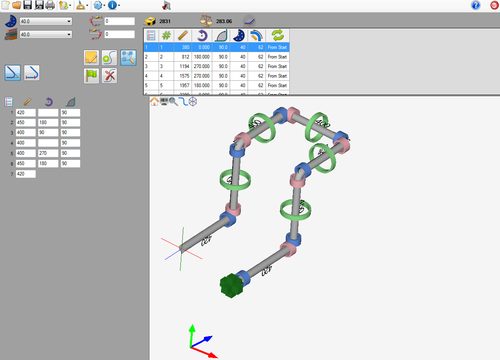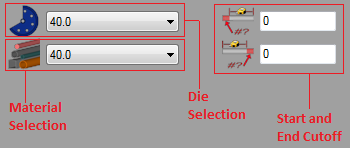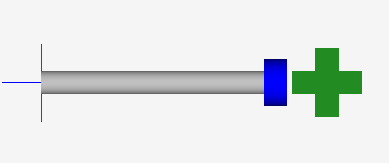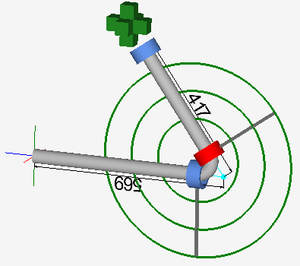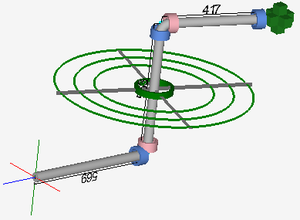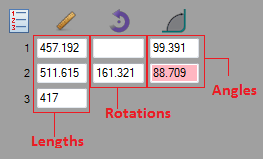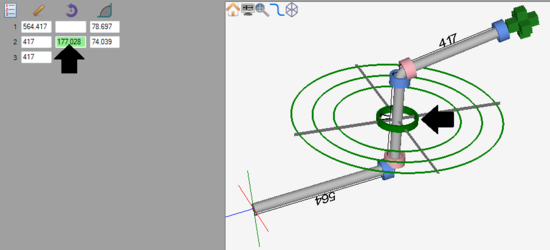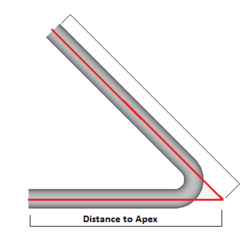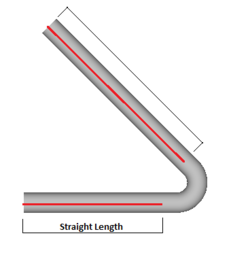Difference between revisions of "Linear Dynamic Designer"
| (One intermediate revision by the same user not shown) | |||
| Line 1: | Line 1: | ||
==Description== | ==Description== | ||
| − | [[File:lineardynamic.png|right|500px]]The Linear Dynamic Designer allows parts to be designed in full 3D. Parts are created by clicking and dragging each straight length to the right length, each bend to the correct angle, and rotating each section into place. The | + | [[File:lineardynamic.png|right|500px]]The Linear Dynamic Designer allows parts to be designed in full 3D. Parts are created by clicking and dragging each straight length to the right length, each bend to the correct angle, and rotating each section into place. The dimensions can be measured by the length of the straight sections of tube or by the distance from the apex of the bends. |
| + | |||
| + | |||
| + | |||
| + | |||
| + | |||
| + | |||
| + | |||
| + | A tutorial on how to create a part using this designer is available here: '''[[Linear Dynamic Designer Tutorial]]''' | ||
| + | |||
| + | |||
| + | |||
| + | |||
| + | |||
| + | |||
| + | |||
| + | |||
| + | |||
| − | |||
| − | |||
| − | |||
| + | ==How To== | ||
| + | ===Start Up=== | ||
| + | To access this designer, click the linear dynamic button [[File:lindyn.png]] on the start up page. This will open up a new, blank part design. | ||
Latest revision as of 10:09, 10 July 2013
Description
The Linear Dynamic Designer allows parts to be designed in full 3D. Parts are created by clicking and dragging each straight length to the right length, each bend to the correct angle, and rotating each section into place. The dimensions can be measured by the length of the straight sections of tube or by the distance from the apex of the bends.
A tutorial on how to create a part using this designer is available here: Linear Dynamic Designer Tutorial
How To
Start Up
To access this designer, click the linear dynamic button  on the start up page. This will open up a new, blank part design.
on the start up page. This will open up a new, blank part design.
Part Design
Once a new linear dynamic part design window has been opened, a new part can be created.
First, a die and material should be chosen. This can be done by clicking on the drop down menus next to the die and material icons in the top left corner of the screen.
If any cut-off is necessary, enter the amount needed into the start and end cut-off fields. The first/top field represents the cut-off at the start of the part and the second/bottom field represents the cut-off at the end of the part.
To adjust the length, click on the blue ring at the end of the tube and drag it forwards or backwards to adjust the first straight length of tube. The length can also be changed by keying in a length value after the blue ring has been selected.
Note: If any mistakes are made, the last bend can be deleted using the delete bend button ![]() .
.
As new lengths and bends are drawn, the lengths, rotations, and angles will be generated in the columns on the left of the screen. Each bend and the last straight length will have its own row. The first column below the ruler icon represents the straight lengths of tube. The second column below the arrow icon represents the rotations for each bend. Note: Leaving a rotation field blank will be the same as entering 0. The third column below the angle icon represents the angle of each bend.
These can be edited at any point in the design process. Adjust the lengths, rotations, and angles by entering new values in the text fields.
In summary, the lengths, angles, and rotations can be adjusted using 3 different methods:
1.) By selecting the ring on the part and dragging it into place.
2.) By selecting the ring on the part and keying in the value.
3.) By entering values directly into the fields on the left of the screen.
Note that whenever a bend, length, or rotation is selected, the corresponding value in the left panel will be highlighted. See image below for an example.
Controls and Options
To change the way straight lengths of tube are measured, click on the distance to apex ![]() or length of straight
or length of straight ![]() buttons. See the image below for a basic explanation of these two options.
buttons. See the image below for a basic explanation of these two options.
Notes can be attached to the part design project using the note button ![]() . Notes are saved with the part and are included on the part's setup sheet.
. Notes are saved with the part and are included on the part's setup sheet.
To add another bend to the part, click the add bend button ![]() .
.
The auto-zoom option can be turned on or off using the auto-zoom button (On) ![]() / (Off)
/ (Off) ![]() . When activated, auto-zoom will zoom in or out to accommodate the size of the part. For example, if a length is originally 200 and is changed to 2000, it may extend past the part display's extend. Auto-zoom will zoom out to make sure the whole part is visible.
. When activated, auto-zoom will zoom in or out to accommodate the size of the part. For example, if a length is originally 200 and is changed to 2000, it may extend past the part display's extend. Auto-zoom will zoom out to make sure the whole part is visible.
To completely start over and delete the whole part design, click the start over button ![]() .
.
To delete the last bend that was added to the part, click the delete bend button ![]() .
.
